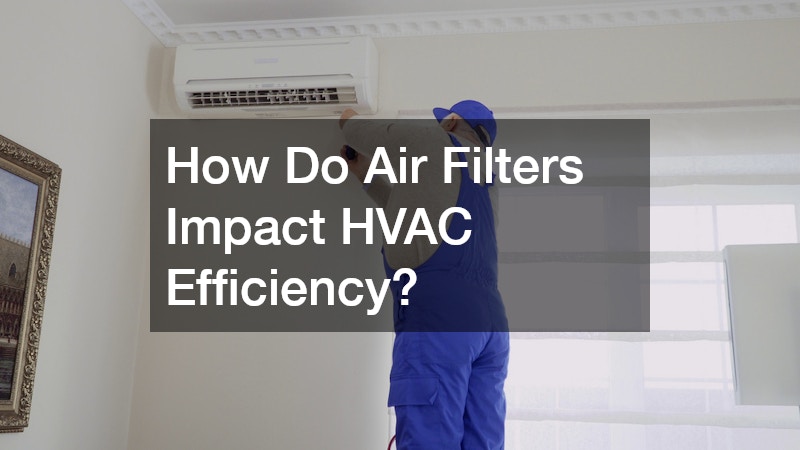Air filters play a vital role in maintaining your HVAC system’s efficiency and air quality in your home. But are they always beneficial, or can they pose risks if not properly managed? This guide explores the dual nature of air filters, offering insights from seasoned HVAC contractors.
How Do Air Filters Impact HVAC Efficiency?
Air filters serve as a crucial barrier between harmful particles and the components of your HVAC system. By trapping dust, pet dander, and other pollutants, filters prevent the clogging and wear of essential system parts.
This not only extends the lifespan of your system but also optimizes the overall airflow dynamics, ensuring balanced and efficient performance.
Well-maintained air filters contribute to maintaining a steady temperature throughout your home, reducing the workload on your HVAC system. As the filters trap particles, they enhance the system’s capacity to circulate air evenly. Ultimately, this results in a lesser need for frequent maintenance and repairs, highlighting their role as protectors of HVAC longevity.
The type of air filter used significantly affects system efficiency. Filters with higher MERV (Minimum Efficiency Reporting Value) ratings capture more particles, but overly dense filters may restrict airflow. Selecting a filter with the appropriate MERV rating ensures a balance between capturing pollutants and allowing adequate air circulation through the system.
Dirty air filters pose a grave threat to the efficiency of HVAC systems. When filters become clogged, they restrict the airflow, making the HVAC system work harder to push air through. This extra effort leads to increased energy consumption, ultimately inflating utility bills due to the inefficiency in energy use.
A clogged filter forces the HVAC system to cycle more frequently, putting additional stress on the components. This can cause premature wear and tear, leading to breakdowns and the need for costly repairs. Well-maintained filters reduce the likelihood of such inefficiencies, optimizing the overall lifespan of the HVAC unit.
The reduction in airflow caused by dirty filters inevitably impacts indoor air quality. Stagnant air contains higher concentrations of allergens and pollutants, contributing to health issues among occupants. Regular cleaning or replacement of filters ensures that the HVAC system can perform optimally, maintaining both energy efficiency and air quality standards.
What Are the Risks of Using Improper Air Filters?
Inadequate filtration can significantly diminish indoor air quality, presenting health risks to occupants. Filters that are not effective at capturing allergens, pollen, and other pollutants allow these particles to circulate freely. Poor air quality can lead to respiratory issues, allergies, and exacerbation of conditions like asthma among residents.
Exposure to airborne contaminants is a common concern in buildings with improperly filtered HVAC systems. Contaminants such as volatile organic compounds (VOCs) may not be efficiently removed with low-quality filters. Ensuring a high standard of air filtration is crucial to safeguarding the health of those living in the building and enhancing overall well-being.
The connection between indoor air quality and respiratory health underscores the importance of choosing the right filters. When filters fail to perform, dust and allergens accumulate, reducing the comfort and safety of indoor spaces. Regularly updated and high-functioning air filters help maintain a clean and healthy living environment, proving essential for health maintenance.
How Often Should Air Filters Be Replaced?
Understanding the standard intervals for air filter replacement is crucial for maintaining HVAC system efficiency. Most residential filters require replacement every 90 days to ensure optimal performance under typical household conditions. Regular adherence to these guidelines helps keep energy consumption low and air quality high, maintaining system integrity.
In environments with higher dust, pollen, or pet dander levels, more frequent replacements may be necessary. Households with pets, smokers, or inhabitants with respiratory conditions should consider replacing filters every 30-60 days. Consulting with HVAC professionals can provide more specific insights based on individual household needs.
The key to effective HVAC maintenance is proactive filter management, which includes understanding the replacement timelines. Keeping track of replacement dates and setting reminders can help residents stay ahead of potential air quality or system performance issues. Regularly replacing filters not only extends system life but also enhances the quality of indoor air.
Understanding the role of air filters in your HVAC system is crucial for maintaining efficiency and ensuring a safe indoor environment. By selecting the right filters and replacing them regularly, you can significantly benefit your system’s performance and the air quality of your home. Implementing these best practices not only enhances energy efficiency but also promotes a healthier, more comfortable living space.

